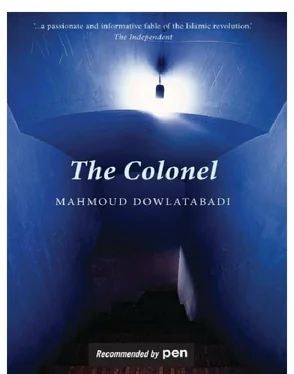From near and far came the sound of occasional shots, as if to remind Amir what a risk he was taking by sheltering Khezr Javid. It was precisely the likes of Khezr they were shooting. The odd thing was that Khezr remained completely oblivious to all the goings-on outside, or at least pretended to be. To all outward appearances, he seemed to regard everything that was taking place as completely normal and natural. Amir, however, knew that Khezr was no slouch and that this detached and carefree attitude of his, even if he had nerves of steel, could not be real. He must have been driven by some inner sense of security and self-confidence that underlay all this show of coolness. After all, he was not some unknown, nameless policeman. It was a sign of his thrusting ambition but also of his raging inferiority complex that he had once declared, ‘Did you know that I was the only one in the office not to have a cover name?’ Amir saw no reason not to believe his story about the three ex-prisoners of his, presumably revolutionaries, whom he had come across in the street. Amir knew Khezr well enough to suspect that, aside from his sheer bravado, he must have some other trump card up his sleeve. Had he not once said himself that he had been one of the organisers of the demonstration of jobless security policemen protesting outside the prime minister’s office in the Revolutionary Government? During his time in prison, Amir had come to the conclusion that SAVAK was the most solid and tightly structured of all the secret services. But did its members really believe in what they were doing? It was fair to assume that the people’s revolutionary uprising must have had some effect even on people like Khezr, and made them reflect, if only briefly, on the lives that they had led. For sure, with all the courage of his profession, Khezr was not going to admit to his own fear of the revolution. Otherwise, why was it that his incoherent mutterings when he was in his cups, whether uttered consciously or sub-consciously, all had to do with the revolution?
“Couldn’t you — or weren’t you allowed — to do anything without permission? It could have been done, I know it could have been done, because even we had had a plan to shoot Khomeini, but we weren’t allowed to do it. What about you? You had orders from on high not to do anything! Oh yes… you lot assassinate people when you are supposed not to be terrorists, and when you are supposed not to be democratic, you become democrats all of a sudden. You’re nothing but hired mercenaries, traitors to your country!” 42
I was looking up at the bulging basement ceiling, with half a smile on my face and thinking how interesting this all was. Because there was no doubt that, no matter what we did, we were traitors and were to blame. The men who ran State Security held the whip hand over the country’s oil, the police, the SAM-7 anti-aircraft missiles and the army. All we needed was a nod and a wink to blast the Leader of the Revolution out of the sky and into eternity! No, it’s our fault, whatever we did or didn’t do. The worst of it is that, whatever we might or might not have done, the end result is that we are to blame, and we are traitors to our country as well.
“It’s you who claim to be carrying history forward, not me, not us!”
“But, even if we could have done it, we couldn’t have blown up someone who was supposed to be the saviour of the nation.”
“Was supposed to be, or you supposed him to be?”
Khezr was sitting up now, confused, looking at Amir. Out of respect for him, Amir was obliged to reciprocate and prop himself up on his elbow so that he could look back at him. He was expecting Khezr to lay into him with renewed vigour, but instead, he pulled the can of arack towards him, poured himself half a glass, downed it in one and settled back on two pillows without a word. This silence may have prompted Amir to ask him, out of sheer curiosity:
“What difference, just what difference would it have made to you if the revolution had turned out differently?”
This time, without blinking an eye, Khezr answered him: “In that case I would have worked for you lot, I’d have been able to have my whisky again, I’d have carried on investigating people and I wouldn’t have had to get a nose job, or stick a floor-brush of a beard on my face in order to work for this bloody bunch.”
“What makes you think we’d have given people like you a job? How come you’re so sure we wouldn’t have just rubbed you out?”
With a quiet smile, Khezr puffed on the cigarette that Amir had lit for him and, with disconcerting certainty, replied: “Listen, boy. Political police are like a religion. Has anyone ever heard of a religion being overthrown?” He paused and went on: “A new gang may take over, but they don’t go and overthrow the very basis of the old régime. I grant you that some of us were strung up by a few of your hot-headed brethren, but that’s not the end of the story. Not by any means. We’re the very base and foundation of everything, we are the underpinning of the state, my engineer friend!”
The cigarette ash was dropping into Amir’s hand, so he fetched an ashtray, and held it under Khezr’s waving hand, catching the ash as it dropped. As Khezr started talking, it was not clear whether he was awake or asleep; he sounded drowsy and he appeared not to be talking to anyone in particular; he was rambling to himself, going over his old life:
“…so I said that I’d come to serve the Shah and my country. I thought that the colonel was staring at my nose. I looked down, so that he couldn’t see my nose, and I asked him to put in a good word for me. I had been recommended to him before. I was fed up with the Thursday evening local teachers’ book club meetings. 43I’d only joined it out of boredom; in fact I had set it up, and I was fed up with it. Fed up with those evenings, and fed up with the teachers who only went along so as not to become opium addicts. And I was fed up with my rickety old bicycle, which always got a puncture on the rocky tracks, and I always had to hump it on my back all the way home to mend the puncture and then go back to the village in the morning to give lessons to those shaven headed, lice-ridden, snotty-faced children about the battles of Xerxes the Great… You were a history teacher, too, weren’t you?
“Yes.”
“Then there was the bloody heat. I was sweating non-stop out of all my seven orifices. Everything was dust, date palms and despair. There was an occasional tall, gangly Arab and some water buffaloes… So I told the colonel that I was tired of teaching, of the bicycle, the humidity, the dust and the children… the filth on their faces would feed seven hungry dogs. I said that I wanted to serve my country. the colonel said he was always delighted to hear from ambitious young men wanting to serve their country. He said that a young man should advance himself and secure himself a bright future, and he said that I appeared to be a deserving young chap. And I was; I was capable and deserving, and this was the first time that anyone had acknowledged me. I was sick of nobody paying any attention to me. I was suffocating from being ignored. If anyone did look at me, all they saw was that I was short and had a big nose. Was that all there was to me — just a shortarse with a big nose, eh? Oh no, I knew I was more than that, I knew I was worth something, not like those teachers who got together on Thursday nights and poked fun at me, in front of me and behind my back, because I didn’t understand the poetry of Nima Yushij 44as well as they did. But I proved, in those first six months, I proved to the colonel that he had not got me wrong.”
“Are you awake?”
“Yes, and I’m listening to you.”
“Don’t imagine I had some sort of illness. No, I was fed up with being humiliated. I wanted recognition. I wanted a sniff of power, because there was nobody who knew how good I was, how deserving I was and how strong I was. I was going to prove this, at any price. So I went and knocked on the colonel’s front door and I told him that I wanted to serve my country, because I had had enough of all the flies buzzing round the filthy heads of my children and I was fed up with the classroom that stank of goodness knows what. But power… real power… that was what I wanted.
Читать дальше












